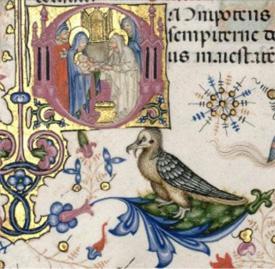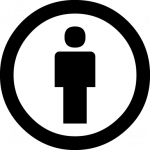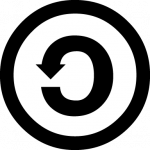
Image courtesy of Allison Muri, University of Saskatchewan, January 2007.
This course is no longer taught at the U-M School of Information. These materials are from an older iteration of the course.
This course addresses a number of fundamental questions in European cultural history centered on the book as both material as well as cultural and social object. Touching on a variety of different physical formats, the course explores questions of authorship, production, manufacture, distribution, and reading of books, as well as their restriction and periodic prohibition. The course makes use of the University's large special collections holdings and students carry out extended individual projects using these holdings. The final unit of the course is devoted to the fundamental changes in print culture being fostered by the Internet and hypertext, with examination in particular of the University of Michigan's evolving role in the novel enterprise of electronic book circulation.
Instructor: School of Information Faculty
dScribe: Lisa Wheeler
Course Level: Graduate
Course Structure: Weekly 3-hour seminar
Syllabus
General Description
This course addresses a number of fundamental questions in European cultural history centered on the book as both material as well as cultural and social object. Touching on a variety of different physical formats, the course will explore questions of authorship, production, manufacture, distribution, and reading of books, as well as their restriction and periodic prohibition. Meetings will make frequent use of the University’s large special collections holdings, and students are encouraged to carry out extended individual projects using these holdings. The final unit of the course will be devoted to the fundamental changes in print culture being fostered by the internet and hypertext, with examination in particular of the University of Michigan’s evolving role in the novel enterprise of electronic book circulation.
The goals of this course are at once practical and theoretical: among others, to give you the knowledge and experience to work comfortably with Special Collections material, to situate the work of innovative bookmakers in the larger cultural scheme of the reception and dissemination of their products, to provide a forum for assessing and debating the sweeping changes in the nature of print culture that appear to be underway.
Course Materials
• Textbooks for purchase at Shaman Drum bookstore (also on closed reserve, Shapiro Library): Christopher De Hamel, Scribes and Illuminators, 1992 Michael Twyman, The British Library Guide to Printing, 1998
• Supplemental online materials will be posted to the CTools site.
• In addition, please purchase by the third class session a 3.5 or 5.0 mm felt-tipped black calligraphy pen, “Y & C” brand, at Michigan Book and Supply; 2007 price = $1.49
Principal Coursework
Option A: class participation (¼ of final grade), one book review (¼ of final grade), final project (25+ pp.) (½ of final grade)
Option B: class participation (¼ of final grade), two book reviews (each one-fifth of final grade), shorter final project (12+ pp.) (35% of final grade)
Class participation includes one in-class “present the day’s reading” exercise of five minutes and six response papers submitted on dates of your choosing. (See assignment sheets for details.)
Note: in the event of (minor) discrepancies in scheduling between paper and electronic sources, consider CTools listings take precedence over what is listed below. Please select the reading you would like to present from among those that are underlined.
Class Participation
Although occasionally I will deliver some material through lecture, the course is intended to function as a seminar--that is, as a freely-flowing discussion, an exchange of ideas among people bringing both prior experiences and recently-acquired knowledge to bear on the topic of the class meeting. Some of you may find that giving voice to opinions, however informally, in front of twenty-five or thirty others essentially comes down to an exercise in public speaking, which may not be something for which you feel you have a natural proclivity or interest. Others of you may enjoy the experience of thinking aloud in public and be spurred on to do so by the large class size. Still others may find certain styles of verbal interaction worthwhile but others of dubious value or validity.
Here are a few points I would like to make to facilitate the discussion aspect of the course:
- Speaking up in class is just one of several ways to participate. One can participate in exchanges of ideas through one’s eyes, through the expression on one’s face, through one’s body language. If the whole term came and went without your ever having contributed once verbally to a discussion (which would be a shame, of course, but occasionally this happens) you could also still engage with the class discussions by alluding to and taking inspiration from them in your written work like the response papers and your book review(s). Finally, there is the option, of course, of being particularly energetic in the small group work we engage in.
- I try mightily to lead discussion through open-ended questions, or sometimes deliberately provocative stances, that are intended to elicit your heartfelt opinions rather than corral you into a pre-determined “right answer” (exception made for purely factual points, naturally). If on any occasion you feel that I am fishing for a “right answer,” please let me know privately, as I would like to know what signals I am sending that give this false impression.
- Article and reading summaries, of which each student will do one, should be prepared with the following question in mind: “if I were the only person present having read this text, and the material in it were deemed of crucial importance to all, how would I summarize and comment on it in a succinct manner?” The summary should proceed at a brisk but not excessive pace through the text, always trying to maintain a degree of evaluative distance rather than descending to a slavish listing of points in sequence. There are essentially two types of readings in this class: primarily argumentative and primarily informative. Each presents a slightly different task to the summarizer; in either case, please try to keep your summary lively. You are allowed and even encouraged to editorialize about the text you are summarizing (“I couldn’t follow this part of the argument,” “She seemed on shaky ground when she got to X,” etc.).
- Response papers are an integral part of class participation, and you are encouraged to use them as such. Their function is to allow you in 200 to 400 words to engage with the ideas presented in one or two of the readings or assignments in order to allow you to so some analytical thinking ahead of the class meeting. The hope is that these insights—or questions for clarification--will inform your remarks in discussion. One of the response papers may be an analytical summary of the piece.
- Please note these details for producing response papers: you must prepare at least six of them in toto throughout the term (your choice of dates, but keep reading). Please provide a header for each one conforming to this style: “[Your name], Response Paper 1 of 6,” next one to read “... 2 of 6,” and so on. Response papers are required for Week 12 (27 March, History of Reading), and highly recommended for Week 2 and Week 11 (Milton discussion). Please print them out and hand them in to me at the end of each relevant class session.
- Policy on use of computers, as well as any electronic device with a display screen, in class: A computer, and by extension the classroom’s wireless internet connection, has two or three valid uses in this class. First and most obviously, for the taking of notes. This in normal circumstances I anticipate to be done episodically and sporadically, not continuously. Second, to gather information that could usefully supplement the discussion at hand, in the event of a genuine need for such information. Third, to avail yourself of the inherent disruptiveness of the new communications paradigms that are reshaping our print-based pedagogical models as profoundly as the advent of printing reshaped and disrupted the oral models of the fifteenth century in European classrooms. In other words, you are welcome to challenge conventional hierarchies of authority occasionally, should you so wish. No other uses of computers or electronic-screen devices will be permitted.
Attendance Policy
You may miss one class session, no questions asked, for whatever reason you deem appropriate. I generally prefer if you can alert me either ahead of time or after the fact, but this is not necessary. You are responsible for taking the initiative of informing yourself about exactly what you may have missed in the session at which you were absent, including announcements. If you need to miss more than one session for a compelling reason, please be in touch with me. If you miss more than one session and I do not hear from you, you should expect your term grade to be affected, since the class meetings are an integral part of the course.
Formal Writing Assignments
In general, I would greatly appreciate it if your formal writing assignments (book reviews and final project) were composed in standard academic prose. Students who have pursued humanities majors (history, literature, film studies, philosophy, and so on) generally need make no adjustments to their writing style. Occasionally students who have taken technical majors find they need some guidance on my expectations. If you habitually write two-sentence paragraphs or cannot conceive of composing without using bullet points, you may want to consult with me. A clear, concise, methodical and reflective style will stand you very well in this course.
Book review(s): The point is to summarize the work cogently and engage critically with several points of its reasoning. The list of works to choose from will be made available early in the term on the course CTools site. See the CTools site also for a formal assignment sheet.
- Length: First book review: 2000-2500 words
- Second book review: 2500-3000 words
Quality is always preferable to quantity. Turning in a well-written 2200-word essay is much better than submitting a rambling 3000-word one.
Final Project
This is a research paper meant to allow you to delve into some aspect of the course in much greater depth. You should plan on putting some specific form or class of material artifact at the center of your analysis, especially if you are pursuing the longer paper (Option A). If you are pursuing Option B, you may, if you wish, treat a theoretical or problem question that does not entail use of primary sources. Again, see the assignment sheet posted to CTools for much more detail and possible topics.
- Length: 6000-7000 words (Option A), 3000-3500 words (Option B)
Schedule
Week 1: Course overview: Goals, methods, materials. What is a book?
Week 2: Materials I: The prehistory of the book; papyri; codex vs. roll; writing materials
Readings
• G. Bologna, pp. 11-17 of introduction to her Illuminated Manuscripts
• Martial’s Epigrams (brief excerpts)
• Either Roberts and Skeat, The Birth of the Codex, chaps. 2, 5, 9, 10 or Peter Stallybrass, “Books and Scrolls: Navigating the Bible”
• Christopher de Hamel, Scribes and Illuminators, Introduction (4-7)
Ch. 1, “Paper- and Parchment-Makers” (8-26)
Ch. 2, “Ink-Makers and Scribes” (27-44)
• Early Writing Materials Websites (if you have time)
Assignment:
Response paper recommended for Roberts & Skeat, Stallybrass, or de Hamel.
Week 3: Materials II: Scripts and Manuscripts; the Architecture of Writing
Readings
• Either Christopher de Hamel, Scribes and Illuminators Ch. 3, “Illuminators, Binders, and Booksellers” (45-69) or Febvre and Martin, Coming of the Book, ch.1(paper) (pp. 29-44)
• Giulia Bologna, “From Scroll to Illuminated Codex,” ideally pp. 18-39, at least pp. 23-30
• Gary Hustwit, Helvetica (2 volunteers may present) 2007 documentary film; DVD available at Askwith Media Library,Video D 46483-D, or Art&Architecture library, basement, Video DZ 246 H 454 2007. Please watch in library, beginning at odd-numbered hours (1:00, 3:00, 5:00, etc.).
Week 4: Orality, Literacy, Media Studies
Readings
• Ong, “Orality and Literacy: Writing Restructures Consciousness”
• Postman, “Media as Epistemology”
• McLuhan, Gutenberg Galaxy, excerpts
• Plato, Phaedrus, short extract
Assignment:
Special Collections Visit I: prepare manuscripts exercise no. 1 for class meeting
Week 5: Moments of Paradigm Shift and The Architecture of Writing, II
Readings
• Johannes Trithemius, In Praise of Scribes, c. 1490, short extract
• Lowry, “Men of Business and Men of Letters”
• Gaskell, “Printing type,” A New Introduction to Bibliography, 9-39
Week 6: The advent of the printed book, I
Readings
• CoB Preface (pp. 9-13)
• CoB ch. 2 (pp. 45-76) (“Technical Problems and Their Solution”)
• Twyman, BL Guide to Printing, ch. 1 & first portion of ch. 2 (pp. 8-35)
Assignment
Book review #1 due (all students)
Week 7: The advent of the printed book, II
Readings
• CoB, ch. 3 & ch. 4 (Visual Appearance; Book as Commodity) (pp. 77-127)
Assignment
Special collections visit 2: prepare documents exercise no. 2 for class meeting
Week 8: Winter Break
Week 9: The advent of the printed book, III
Readings
• CoB ch. 5 & ch. 6 (Labor issues and booksellers; Geography of the book trade)
• Twyman, BL Guide to Printing, ch. 2 to end (pp. 35-45)
Week 10: The advent of the printed book, IV
Readings
• Elizabeth Eisenstein, “Western Christendom Disrupted,” 148-86
• Elizabeth Eisenstein, “The Book of Nature Transformed,” 187-254
• Christiane Andersson, “Polemical Prints During the Reformation”
Assignment
Special Collections Visit 3 For class presentations only (not a general assignment):
Week 11: Censorship and the Book as Locus of Freedom of Expression
Readings
• CoB, ch. 7 section 6 (“Censorship and Banned Books”)
• Milton’s Areopagitica
• Rockwell’s Freedom of Speech
Assignment
For a class presentation only (not a general assignment):
• David Tribe, “As Old as History,” chap. 2 of Questions of Censorship
Option B students: Book Review #2 due
Response paper recommended for Milton reading.
Week 12: The Book as a Locus for Practices of Reading
Reading
• Multiple short readings will be posted
Assignment
Response paper required (min. 400 words).
Week 13: Printing in the Industrial Age
Reading
• Twyman, BL Guide to Printing, ch3 and ch. 4, pp. 45-82
• Possible additional reading TBA
Special Collections visit no. 4
Assignment
Due: 2-3 pp. synopsis and bibliography on final project research (Options A and B)
Week 14: Future of the Book I: The Electronic Frontier
Readings
• Paul Duguid, “Material Matters: The Past and Futurology of the Book” (pp. 63-102) (CTools)
• Carla Hesse, “Books in Time” (pp. 21-36) (CTools)
• If time: e-Readers such as Kindle
Assignment
Response paper recommended for Duguid or Hesse reading.
Week 15: Future of the Book II: Liberational Textuality Google scanning project and copyright; Espresso Book Machine
Readings
• Two or three shorter articles TBA

Image courtesy of Allison Muri, University of Saskatchewan, January 2007.
| Document Title | Creator | Downloads | License |
|---|---|---|---|
|
Syllabus |
School of Information Faculty
|
| Document Title | Creator | Downloads | License |
|---|---|---|---|
|
Book Review Assignment |
School of Information Faculty
|
||
|
Complete Assignment List |
School of Information Faculty
|
||
|
List of Books for Review |
School of Information Faculty
|
| Document Title | Creator | Downloads | License |
|---|---|---|---|
|
Week 02 and 03: Key Terms and Notions from the Reading |
School of Information Faculty
|
||
|
Week 02: Replica of Bronze-Age Wax Tablet |
School of Information Faculty
|
||
|
Week 03: The History and Future of the Book 14th- and 15th-century Satire |
School of Information Faculty
|
||
|
Week 03: The History and Future of the Book 15th-century Breviary |
School of Information Faculty
|
||
|
Week 06: Technical Terms; The Coming of the Book; chapter 2 |
School of Information Faculty
|
| Document Title | Creator | Downloads | License |
|---|---|---|---|
|
week 06: Latin that strangely familiar language |
School of Information Faculty
|
| Document Title | Creator | Downloads | License |
|---|---|---|---|
|
Online Readings Week 2 |
School of Information Faculty
|
||
|
Online Readings Week 4 |
School of Information Faculty
|

Image courtesy of Allison Muri, University of Saskatchewan, January 2007.
Jump to:
| Document Title | Creator | Downloads | License |
|---|---|---|---|
|
Book Review Assignment |
School of Information Faculty
|
||
|
Complete Assignment List |
School of Information Faculty
|
||
|
List of Books for Review |
School of Information Faculty
|
||
|
Syllabus |
School of Information Faculty
|
| Document Title | Creator | Downloads | License |
|---|---|---|---|
|
Online Readings Week 2 |
School of Information Faculty
|
||
|
Week 02 and 03: Key Terms and Notions from the Reading |
School of Information Faculty
|
||
|
Week 02: Replica of Bronze-Age Wax Tablet |
School of Information Faculty
|
| Document Title | Creator | Downloads | License |
|---|---|---|---|
|
Week 03: The History and Future of the Book 14th- and 15th-century Satire |
School of Information Faculty
|
||
|
Week 03: The History and Future of the Book 15th-century Breviary |
School of Information Faculty
|
| Document Title | Creator | Downloads | License |
|---|---|---|---|
|
Online Readings Week 4 |
School of Information Faculty
|
| Document Title | Creator | Downloads | License |
|---|---|---|---|
|
week 06: Latin that strangely familiar language |
School of Information Faculty
|
||
|
Week 06: Technical Terms; The Coming of the Book; chapter 2 |
School of Information Faculty
|



